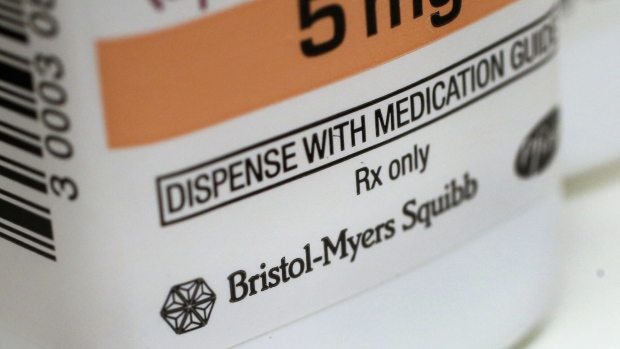Oct 8, 2023
Bristol Myers to Buy Mirati Therapeutics for $4.8 Billion
, Bloomberg News

(Bloomberg) -- Bristol-Myers Squibb Co. agreed to buy drugmaker Mirati Therapeutics Inc. for $4.8 billion to expand its aging portfolio of cancer drugs.
Mirati shareholders will receive $58 a share in cash, the companies said on Sunday. Stockholders will also be eligible for a further payment of $12 a share, potentially worth another $1 billion, should an experimental cancer drug meet certain milestones.
The purchase will give a boost to Bristol as patent expirations weigh on sales of its oncology medicines. The company had to slash its revenue outlook this year after sales of blood cancer drug Revlimid, its third-largest revenue driver, withered in the face of generic rivals. Its top-selling blood thinner Eliquis and cancer immunotherapy blockbuster Opdivo are also scheduled to face competition from generics later this decade.
Bloomberg News reported last week that Mirati was being studied by French drugmaker Sanofi and could also attract other pharmaceutical companies. Bristol’s offer of $58 per share represents a 35% premium to Mirati’s closing price on Oct. 4, the last trading day before Bloomberg News reported the interest.
Shares of Mirati surged 45% on Thursday following Bloomberg’s report on the deliberations with Sanofi. The stock declined 2.6% to $58.65 before the market open in New York on Monday.
Chris Boerner, who takes over as Bristol’s chief executive officer from Giovanni Caforio later this year, said “Mirati is another important step forward” in the drugmaker’s effort to broaden its range of oncology treatments and build out its pipeline for the second half of this decade.
The company has turned to a raft of new products to make up the current and looming sales deficits, such as psoriasis treatment Sotyktu, but they will need time to generate demand. Meantime, Eliquis is one of the first 10 drugs to be subject to Medicare drug-price negotiations under the landmark Inflation Reduction Act.
First Product
Mirati is in the process of rolling out its first product to patients, a lung-cancer drug called Krazati, and the announcement ended speculation about who would purchase the San Diego-based firm.
A sale will give Mirati further resources to commercialize the lung-cancer treatment Krazati — a second-line therapy for a type of lung cancer in which the KRAS gene has mutated — and to fund more studies. Mirati received accelerated approval from the Food and Drug Administration in December, though European regulators have so far withheld support for the medicine.
“We view the deal as a modest positive for Bristol,” BMO Capital’s Evan David Seigerman wrote in a research note, citing challenges seen “in the early days of Krazati’s commercialization.”
Seigerman says the real value driver of the deal may be the experimental drug that targets a gene that promotes cancer proliferation called PRMT5, given recent optimism for the drug, which is in early stage trials.
The transaction was unanimously approved by both the Bristol Myers and Mirati boards of directors.
--With assistance from Michael Hytha.
(Adds premium in fourth paragraph)
©2023 Bloomberg L.P.


